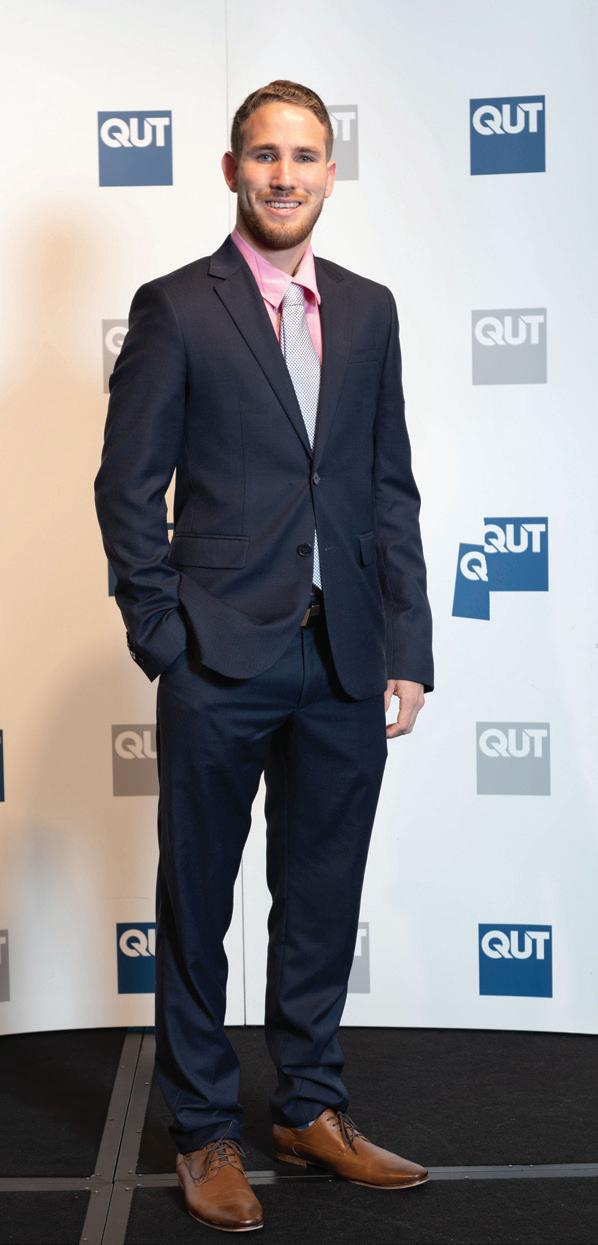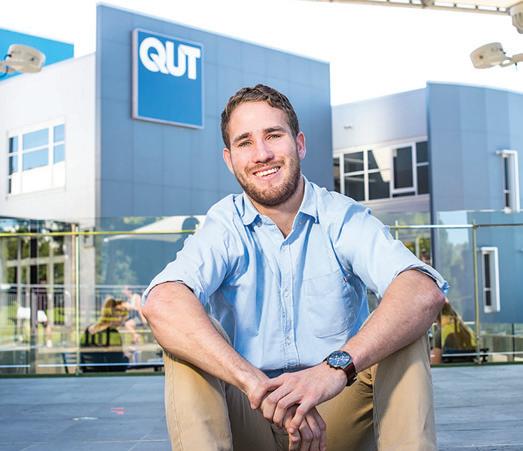
5 minute read
Jed Fraser
by NCSEHE
Image © Aaron S. Veryard
Jed Fraser is a proud Bidjara and Mandandanji man. He is currently studying a Masters of Public Health at Queensland University of Technology (QUT) while working as a research officer at Queensland Aboriginal and Islander Health Council (QAIHC).
Advertisement
Jed is passionate about supporting Aboriginal and Torres Strait Islander youth to reach their potential, with a particular focus on career pathways and Indigenous health.
“I am a proud Aboriginal man coming from the Bidjara and Mandandanji clans from South West Queensland. I am very passionate about supporting Indigenous education and health, and as an Indigenous person who was lucky to go to a good school and that had a different pathway into university, I feel I am obligated to do my part for my people. If I can help one kid get to tertiary education and inspire, then I can live happy.
I am currently studying a Masters of Public Health at QUT after graduating from a Bachelor of Exercise and Movement Science and I work as a research officer at Queensland Aboriginal and Islander Health Council (QAIHC). I have been fortunate to have previously been a Student Representative Committee (SRC) member for Indigenous Allied Health Australia (IAHA); Indigenous Officer for the QUT Student Guild; Explore Uni Ambassador; Oodgeroo Unit Ambassador; Indigiso (Indigenous student society) co-founder and former President; World Indigenous Peoples Conference on Education (WIPCE) presenter; Union of Aboriginal and Torres Strait Islander Students representative and Beyond the Broncos mentor. These opportunities were extremely rewarding for me, as I could grow as a leader and to give back to my community is extremely fulfilling. I went to high school in Yatala, Queensland, studying prevocational maths, English communication, physical education, hospitality, and technology studies in my senior years, as well as doing a school-based apprenticeship as a chef. I enjoyed physical education and hospitality, as well as playing sports and the social aspect of seeing my friends, but really struggled with motivation. As I was undertaking an apprenticeship, I didn’t feel I needed to go to school or complete my assessments. Luckily, I had two teachers and my parents who really helped me; plus, Mum and Dad made me stay at school.
After I graduated, I quit my chef apprenticeship as it wasn’t the career path that I wanted to stay with. I went to Brisbane TAFE in 2014, studying a Certificate IV in Fitness and a Diploma in Sport Development, but midway through 2014, I started to aspire to go to university.
I remember talking to one of my old teachers from school (as I worked at the school as a sports coach) about what I would do once I finished my diploma. He was encouraging me to go to university. At the time, I didn’t feel I was smart enough and that university wasn’t realistic, but he told me that I could do it, and that I am smart. Having someone tell me this really motivated and reassured me. At the time, I wanted to be a secondary physical education teacher; therefore I needed to go to university. However, my career aspirations have, and continue to, change.
ABOUT EXPLORE UNI
Explore Uni (EU) is QUT’s signature Widening Participation program. It is a scaffolded strengths-based program of residential camps and on-campus days immersing school students from low SES backgrounds in experiences that aim to build aspiration for post-school study; shatter myths about tertiary education; and boost students’ confidence.
Key elements include tertiary student ambassadors, embedded career development, and dynamic disciplinerelated workshops which bring future opportunities to life. Student role models from low SES backgrounds use prevalent myths about tertiary education to frame their personal “success” stories.
Many students from low SES backgrounds face barriers to tertiary participation due to the effects of intergenerational poverty and racism. Developing awareness and interest in the opportunities provided by tertiary study is a journey, not a single revelatory experience, and involves issues of identity and imagination, not just information. This is why EU, offered to schools with low rates of progression to tertiary education, systematically addresses five conditions which must all be met before low SES students enter tertiary education: awareness; aspiration; achievement; affordability; and access. The program is designed so students experience gradual growth in awareness, aspiration and capability through multiple engagements over time.
More information on Explore Uni is available here: www.qut.edu.au/about/equity/widening-participation INDIGENOUS MENTOR/AMBASSADOR

I first became aware of the HEPPP-funded programs available to assist students through the Explore Uni program and through the Oodgeroo Unit at QUT. One of the main strengths of Explore Uni, in my view, is its holistic approach; the program gives students a well-rounded view of the importance of education. I also think having actual university students running the program who can connect with the younger students is another strength.
The most important personal skill, I believe, is being able to relate to students. If you cannot connect on a personal level, they can easily lose attention, but if you can make that connection, you can inspire them. I was fortunate enough to work as the Widening Participation Support Officer for six months where I got to see the other side of planning programs and being a role model for the student ambassadors.
My advice to other students in pursuit of success would be to get involved with extra activities whilst at school or in higher education. The opportunities out there are endless — you’ve just got to put your hand up and say ‘yes’.
My most significant successes so far would have to be being an SRC for Indigenous Allied Health Australia; having the opportunity to present at the WIPCE in Toronto 2017; graduating my bachelor degree in 2018; and being the recipient of the 2018 QUT Alumni Special Excellence Leadership Award for my work with Aboriginal and Torres Strait Islander communities, particularly in education and health. However, real success in my eyes is reaching your potential.
In 2019, I was part of a new program that was launched called Pass the Yarn, QUT partnered with Brisbane Aboriginal and Torres Strait Islander Community Health Service (ATSICHS) where we had 30 young Indigenous students. This program focused on career pathways and Indigenous health which meant a lot to me, particularly being the lead for the program. The students got so much out of the program and it was really inspiring seeing these students grow over the program. I want to continue helping my young people, as they are the future for our communities.
I know I haven’t reached my potential as yet, and strive in my everyday life and studies to see what my real potential is. That is true success in my eyes.”
Image © Erika Fish
ORIGINAL STORY AVAILABLE ONLINE: https://www.ncsehe.edu.au/my-story-studentvoice-jed-fraser/










